Ranking the NHL's top 5 defensive pairings
After breaking down the NHL's top forward trios, we're shifting our focus to the league's best defensive pairings.
This exercise isn't designed to highlight the most talented individual defensemen. Instead, we're looking to establish the five most effective defensive pairings from a season ago, using both counting stats and advanced analytics.
For a tandem to be eligible, it must be intact for the upcoming campaign.
All stats are from five-on-five play during the 2019-20 regular season, with a minimum of 400 minutes played. League ranking is in parentheses.
TOI: Time on ice
CF%: Corsi For
GF%: Goals For
xGF%: Expected Goals For
HDCF%= High Danger Chances For
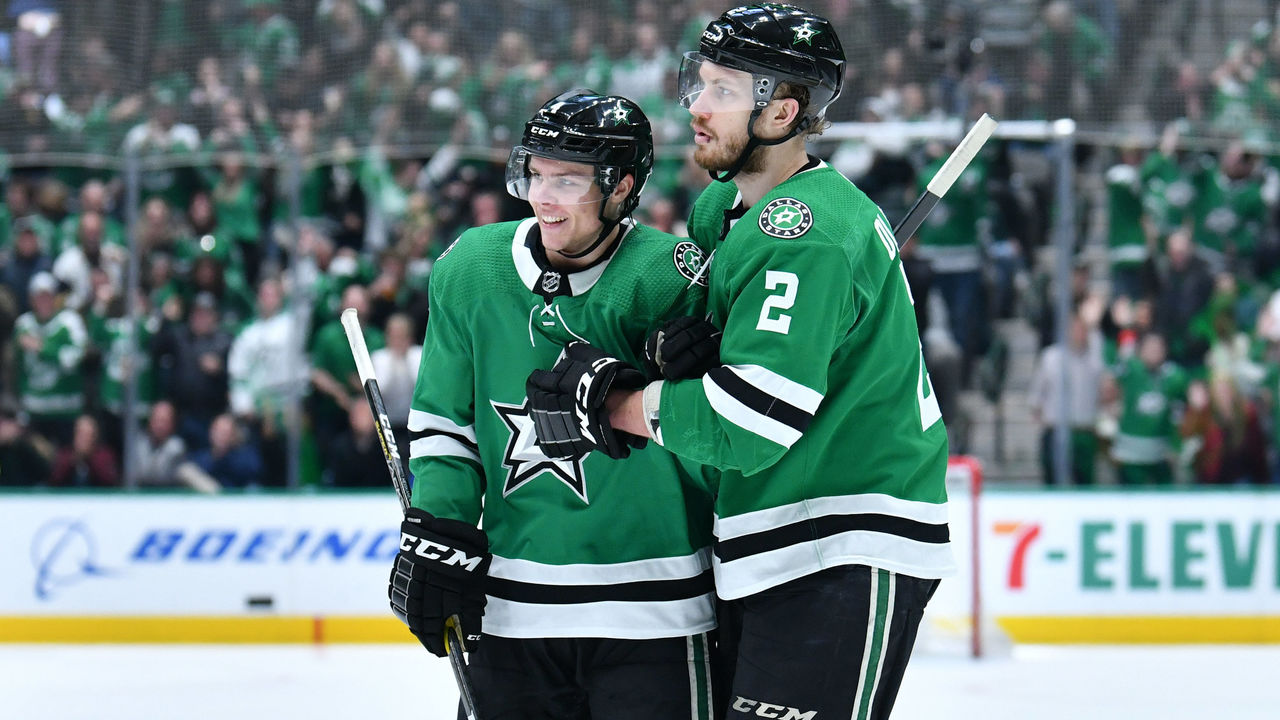 Glenn James / National Hockey League / Getty
Glenn James / National Hockey League / Getty| TOI | CF% | GF% | xGF% | HDCF% |
|---|---|---|---|---|
| 467:15 (49th) | 52.86 (15th) | 59.09 (7th) | 61.50 (1st) | 60.61 (2nd) |
Heiskanen's breakout campaign and Oleksiak's bounce-back season occurred at the perfect time for the Dallas Stars. The pair were sensational at both ends of the ice, with their play helping to lift the Stars from postseason contenders to Stanley Cup finalists.
Oleksiak's size, grit, and defensive acumen blends perfectly with Heiskanen's elite skating and puck-moving ability. The former struggled to find his place following his arrival in Dallas at the 2018 trade deadline, but Oleksiak rebounded after starting the 2019-20 season in the Stars' system. His strengths allow Heiskanen to roam the ice and contribute offensively while not worrying about being burned defensively.
The only thing keeping the pair from being higher on this list is relatively low usage. However, Heiskanen and Oleksiak would have cracked the 500-minute mark over an 82-game slate, and the sample size of play from the two is large enough to prove their performance is no fluke.
4. Jeff Petry-Brett Kulak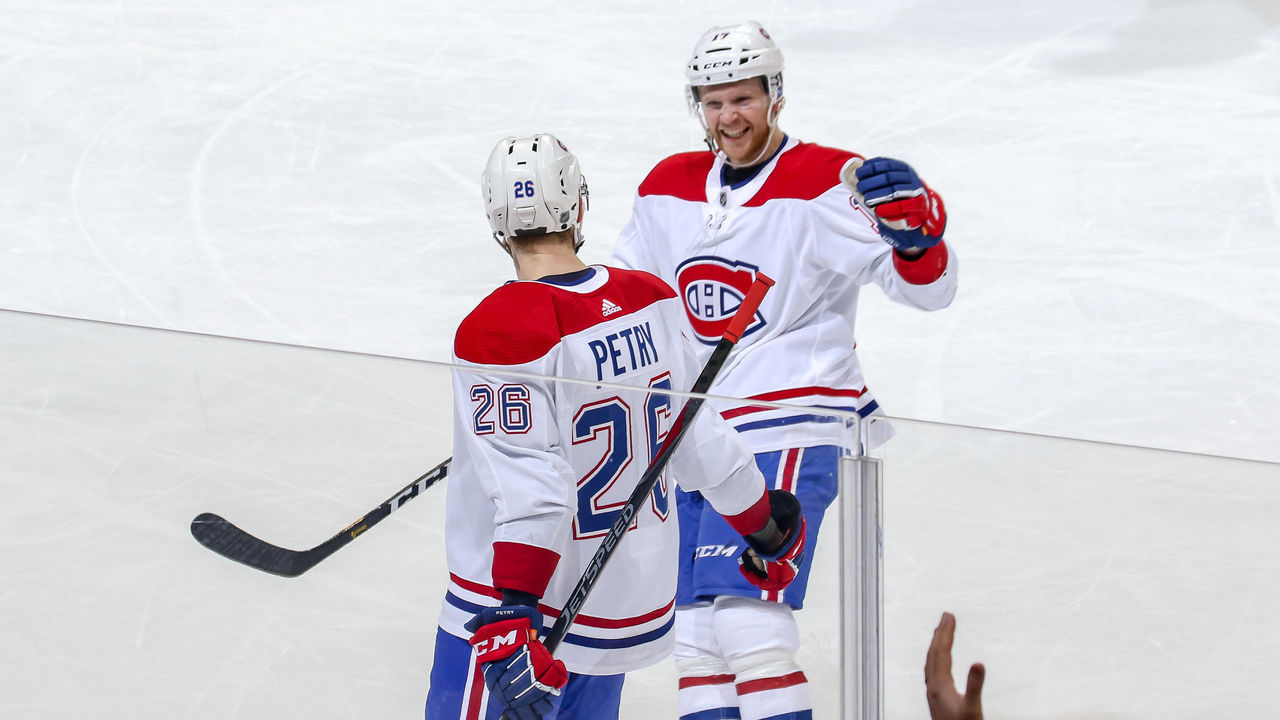 Jonathan Kozub / National Hockey League / Getty
Jonathan Kozub / National Hockey League / Getty| TOI | CF% | GF% | xGF% | HDCF% |
|---|---|---|---|---|
| 543:00 (33rd) | 60.30 (1st) | 52.38 (29th) | 61.00 (2nd) | 61.41 (1st) |
The Canadiens rewarded Petry with a splashy four-year, $25-million pact after he put together perhaps the best season of his career at age 33. Meanwhile, Kulak's offensive production dropped, but he took a leap defensively and recorded some of the best metrics of his career at that end of the ice.
The pair made a major impact at both ends, finishing with a leading share of high-danger chances and a second-ranked expected goals share. However, Montreal's lackluster offense - which produced a 25th-ranked shooting percentage (7.49%) at even strength - didn't yield the results the duo's strong play warranted.
The pairing also controlled possession. Petry and Kulak owned the best Corsi For among all blue-line duos, with a convincing amount of play taking place in the offensive zone when the two were patrolling the ice.
3. Jared Spurgeon-Ryan Suter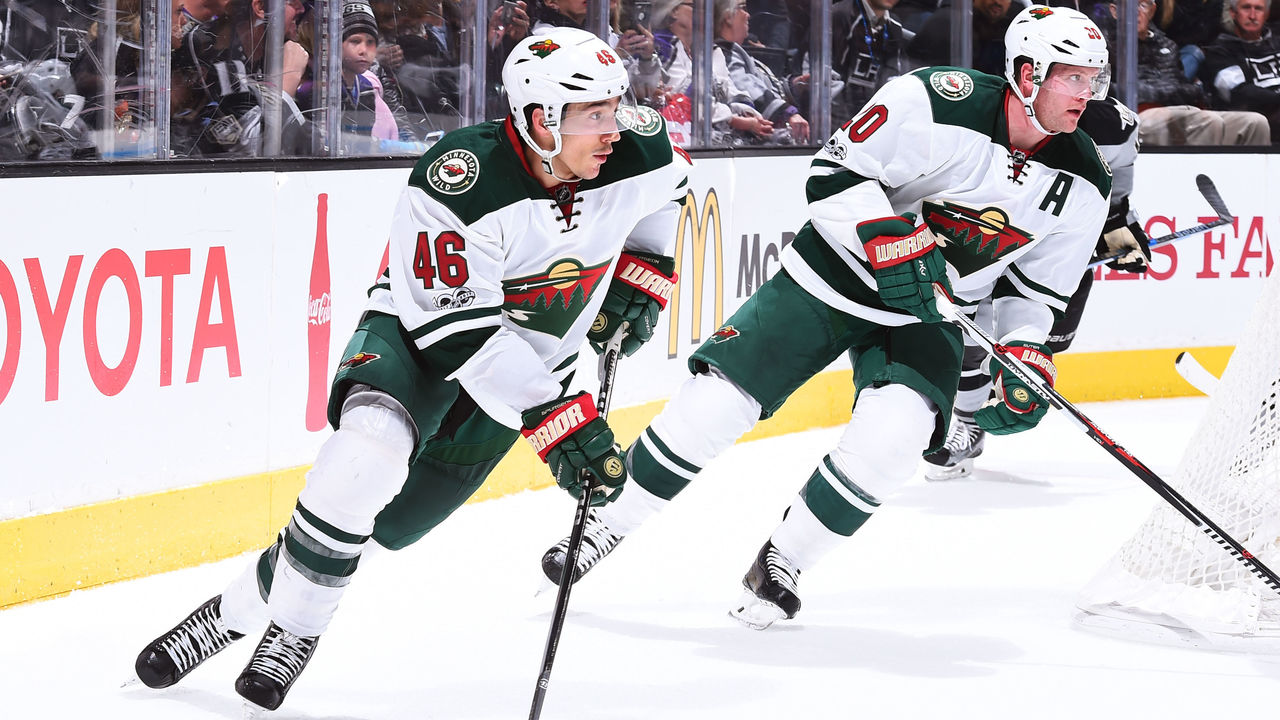 Juan Ocampo / National Hockey League / Getty
Juan Ocampo / National Hockey League / Getty| TOI | CF% | GF% | xGF% | HDCF% |
|---|---|---|---|---|
| 906:46 (4th) | 53.00 (13th) | 57.83 (11th) | 57.66 (4th) | 60.44 (3rd) |
Suter and Spurgeon have been the backbone of a strong Minnesota Wild blue line for years, and the veteran duo doesn't appear to be slowing down despite logging heavy minutes.
The pairing ranked fourth in ice time together and eighth while shorthanded this past season. The high-level play from Suter and Spurgeon was even more significant considering the woeful state of Minnesota's goaltending in 2019-20. The Wild ranked 29th in save percentage (.897), and the pairing still outperformed its expected share of goals for at five-on-five.
The tandem also produced strong possession numbers because the two are remarkably responsible with the puck. Spurgeon and Suter were two of just eight defensemen to register under one turnover per 60 minutes of ice time last season (minimum 35 games played).
2. Dougie Hamilton-Jaccob Slavin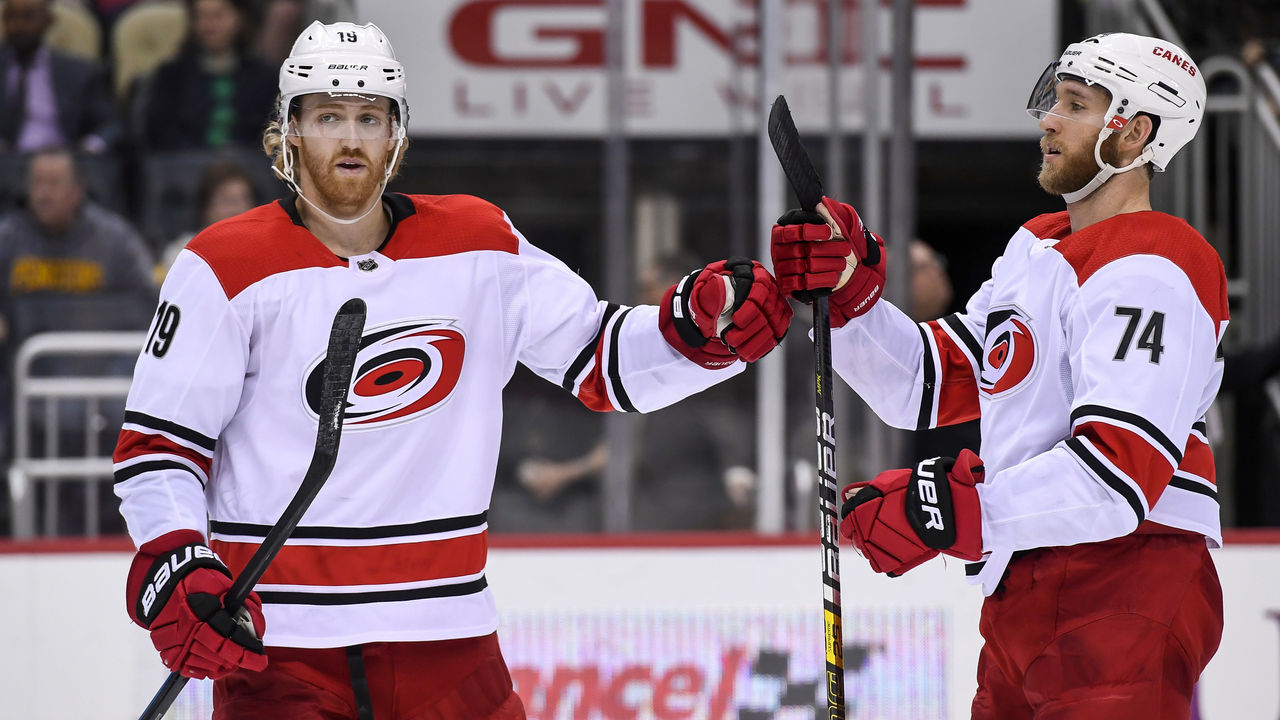 Icon Sportswire / Icon Sportswire / Getty
Icon Sportswire / Icon Sportswire / Getty| TOI | CF% | GF% | xGF% | HDCF% |
|---|---|---|---|---|
| 703:46 (13th) | 58.44 (3rd) | 59.18 (6th) | 57.56 (5th) | 57.09 (8th) |
Hamilton may have missed extended time, but there's no denying the Hurricanes' top duo produced quality work last season. Slavin cemented his status as one of the league's top two-way defensemen, while Hamilton established himself as a perennial Norris Trophy candidate.
The pairing is perfect for the Hurricanes' possession-oriented system, as Hamilton and Slavin are both quality skaters for their size (6-foot-6 and 6-foot-3, respectively), and they're strong at both ends of the ice. The duo is one of just two ranked in the top 10 in all four of the advanced stat categories applied here.
Each player took a major step, too. Slavin led the league with 81 takeaways while pouring in career highs in assists (30) and points (36) despite the shortened season. Hamilton, meanwhile, was on pace for a personal-best 24 goals and 70 points over a full 82-game campaign.
1. Roman Josi-Ryan Ellis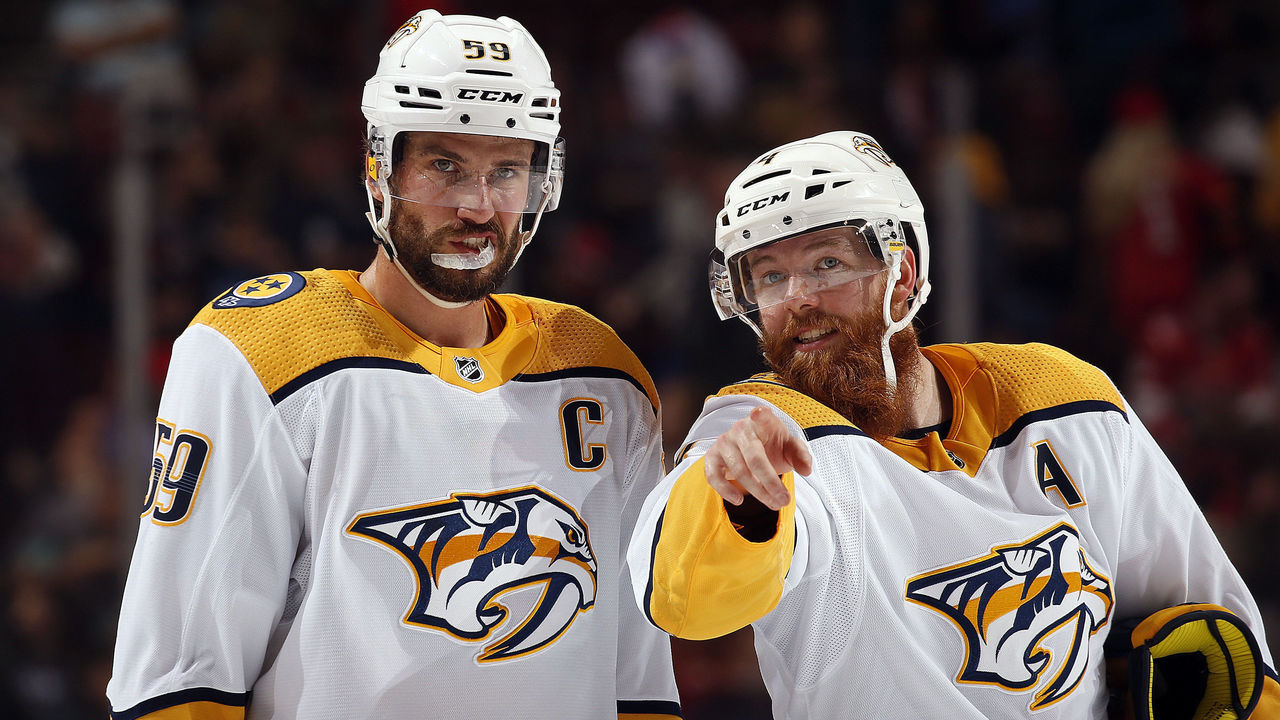 Eliot J. Schechter / National Hockey League / Getty
Eliot J. Schechter / National Hockey League / Getty| TOI | CF% | GF% | xGF% | HDCF% |
|---|---|---|---|---|
| 760:54 (9th) | 54.40 (6th) | 64.10 (3rd) | 57.99 (3rd) | 58.80 (6th) |
If you were starting a team tomorrow and needed to choose an active defensive tandem, it would be tough to pass on the Predators' star pairing.
Josi, the reigning Norris Trophy winner, is one of the world's top blue-liners, while Ellis is somehow still among the most underrated. Nashville's 50 goals scored with Ellis and Josi on the ice at five-on-five ranked second among all defensive tandems, even with the former missing 20 games due to a concussion. Before Ellis suffered his injury, the pairing was on pace to rank No. 1 in that department by a mile.
The duo dominated in every advanced metric, too, finishing in the top six in all four categories while eating a ton of minutes. Josi finished third among all skaters in average ice time (25:47) while Ellis finished 22nd (23:30).
Analytics source: (Natural Stat Trick)
Copyright (C) 2021 Score Media Ventures Inc. All rights reserved. Certain content reproduced under license.